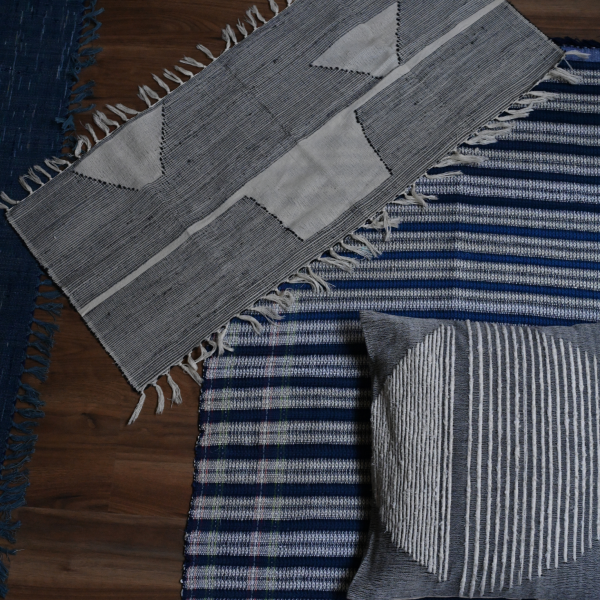“Every second, the equivalent of a rubbish truck load of clothes is burnt or buried in landfill.”
– The Ellen MacArthur Foundation
We exist to question
We exist to reclaim
We exist to decentralize
We exist to decolonize
Iro Iro is a
circular design studio
upcycling waste from the garment industry
by utilizing indigenous craft traditions of India
We are based in Jaipur, India.

UPCYCLED MATERIAL
COMMUNITY-LED PROCESS
We upcycle all kinds of textile scraps—pre-consumer offcuts, used clothes, dead stock, and yarns.
We prevent textiles waste- natural or manmade textiles, to enter landfills.
We do not produce any virgin textile or use virgin material.
We do not promote any material which harms animals or humans.
We ensure no waste generation in our supply chain.
We do not use any plastic in our process.
Our tags, and labels are printed using soot, an airpollutant turned into ink.
Our Textiles- developed by local craft practices employing artisans in different villages of Rajasthan.
This is not only a employment generation process, but a cultural regeneration initiative.
Our products- utilising India’s ancestral knowledge of zerowaste patterning.

CONSCIOUS PRODUCTION
LIVING WAGES
We work with companies committed to human rights, reducing environmental impact, and turning their supply chain’s circular. We require all partners to adhere to our Code Of Conduct.
We function on a made to order policy only.
We ensure year-round work for 35 artisans with payment of living wages.
We also provide our people with entrepreneurship, training, and other business support.
We do not engage with companies violating any kind of labor rights.

5000
Tonnes of CO2 Saved

15,00,000
Litres of Water Saved

50,000
Kilos of textile waste upcyled

35
Artisans

Decentralised
production
MADE TO ORDER POLICY

decolonising fashion

“The rural arts of India are the arts of the settled villages and countryside, of people with lives tuned to the rhythm of nature and its laws of cyclical change, an art with a central concern with the earth and with harvesting…The rural arts of India are the visual expression and technological processes that had remained static for over two thousand years…Rural arts are also the arts of people living in forests and mountains, the ancient inheritors of this land, who claim to be the first-born of the earth…..”(Jayakar, 1980/1989)

Our Journey

We started with the aim to reduce and reuse waste produced by our parent company, a garment factory- SHIVAM INTERNATIONAL.

Our focus was handloom weaving, specially Rug Rag Weaving. We view crafts from the lens of quality and design, and a reclamation of ancestral traditions.

With 3 artisans who trusted our vision and experimented with us, we started Iro Iro. Today, we are a team of 35 craftspeople.

Working from their village, allows them to reuse dye water into farmland and yield better quality of crops. This helps us completely systemitise circularity in our operations.
Our Team
Bhaavya Goenka
Founder, Designer
“Every time we create something, we weave a new story of the old, we reclaim the forgotten, we embrace the rejects.”
Pinky Devi
Apprentice Weaver, Sorting Waste
“I just want to work so I can earn some money and decide to spend it however I want to.”
Hari Narayan
Weaver
“I have been working for 60 years now. Working with Iro Iro allows me to work slowly which suits my lifestyle and pace.”
Bhawar Lal
Weaver
“Because of casteism, I could not dare dream big. I wanted to change that for my children.”
Sarita Devi
Sorting Waste
“I am saving money and sending my daughters to college. For them Marriage will be a choice.”
Ganga Devi
Weaver








